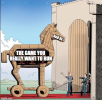Silverlion
Legendary Pubber
- Joined
- Aug 28, 2017
- Messages
- 4,549
- Reaction score
- 8,714
Yes! This! I felt all the Options books really should have been aimed at GM's, I know they wanted players to spend more money, but so much of the stuff needed GM approval (Also some of it was mutually exclusive!)If you stick with just 2E core it’s a great game.



 I saw BECMI or B/X as being pretty much interchangeable. I enjoyed both though my preference was always for B/X, mostly as it was cheaper and the presentation was tighter in play. The presentation of BECMI with its 5 box sets and tutorial style of Basic was attractive to a younger me as a collector and reader (just not so much as a player).
I saw BECMI or B/X as being pretty much interchangeable. I enjoyed both though my preference was always for B/X, mostly as it was cheaper and the presentation was tighter in play. The presentation of BECMI with its 5 box sets and tutorial style of Basic was attractive to a younger me as a collector and reader (just not so much as a player). Other than the Palladium Fantasy bit, which I have never encountered in the wild.
Other than the Palladium Fantasy bit, which I have never encountered in the wild.




